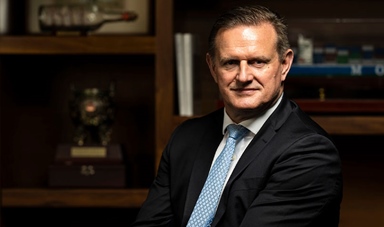Loading component...
At a glance
- Graham Talbot FCPA joined Atlas Corporation and Seaspan as joint CFO in January 2021. Talbot now hopes to grow a recent acquisition, APR Energy, into a global player in the renewable energy sector.
- Previously, Talbot was CFO at a state-owned Abu Dhabi corporation, and prior to this he was based in Copenhagen with Maersk.
- Talbot was educated at the University of Canberra and has an MBA from the Melbourne Business School. He is a fellow of the Governance Institute of Australia and a fellow of the Energy Institute.
- Revenue and profit: Guidance for 2021 is revenue of US$1.5 billion (A$2 billion), with EBITDA at US$930 million (A$1.3 billion).
- CFO’s team: 120
My role: demonstrating value
Atlas Corporation is an asset management company with two platforms, maritime and energy.
We recently acquired APR Energy, which is a world leader in fast-track energy solutions.
Our maritime subsidiary, Seaspan, is the largest container ship lessor in the world – double the size of our nearest competitor – so a lot of my time is spent with investors, analysts and debt holders.
We are somewhat unique and growing rapidly in a changing market and therefore need to effectively communicate our differentiation and the value it adds.
We are also targeting an investment-grade credit rating, which requires considerable work to position the business and its capital structure accordingly.
My role is to match the commercial side of the business with the financial – how do the growth prospects look, how are we evolving the business and how does the balance sheet support all of that?
I spend much of my time explaining our business model to the market and demonstrating how we create value.
We are also in an acquisition phase, investing about US$4.7 billion (A$6.4 billion), and we need to make that case, its execution at each phase and communicate how the delivery of the value is being de-risked through the entire execution phase.
The other part of my role is about how we run the business internally, which is about employee culture, organisation design, process efficiency and, key to us, scalability.
Accordingly, we have very active digital and business transformation programs to support this.
Game changers: learning from challenges
Between 2003 and 2008, I was working for Shell in Kazakhstan on a US$50 billion (A$68 billion) oil development project. It was an extremely difficult regulatory and operational environment.
Every day presented new challenges and, given the scale of the project, the challenges were always big ones.
This type of environment either breaks you or makes you stronger. We were operating in a joint venture company made up of several very large, successful global companies.
Although this brought a lot of horsepower, it also required building specific skills to manage and navigate multiple cultures, both geographic and organisational.
It was a tough time, but I learned so much about all aspects of our business, a lot about myself and built lifelong relationships through the experience.
Challenges: stakeholder engagement
We operate a large fleet of ships, with about 5000 staff around the world.
The market tends to bucket us together with liner companies, which are susceptible to short-term freight rates – which we are not, we operate the vessels on their behalf.
Investors and analysts wrongly think we are susceptible to market volatility when, in actual fact, the vessels are rented at a fixed rate on long-term contracts, up to 18 years.
The challenges relate to explaining this to people.
Always listen, because if investors or analysts have unanswered questions, their ears stop working.
If you want to convey a message, you need to prepare the audience to receive that message. If not, you will not get the desired impact.
One of my favourite quotes is from Charles Mingus, who said, “Making the simple complicated is commonplace; making the complicated simple, awesomely simple, that’s creativity.”
This applies to so many aspects of the CFO portfolio and is a constant guide that I use to assess both my decision-making and communication, and that of my team.
CPA Library
Career lessons learned and best advice
- If you want to be heard, make sure the other party is ready to listen. This requires careful planning and is applicable to all levels of communication. Complex is easy; simple requires deep understanding and creativity, and is hard work.
- Seek out high-impact career opportunities to accelerate learning and development. Getting out of your comfort zone stimulates growth, so take conscious steps to make it happen. Find a higher purpose to drive delivery and performance – it’s critical for self and team.
- Business and work should be enjoyable. As a leader, how will you create an environment for your team to grow, be challenged, deliver and have fun? This is the best part of the job!
- Demystify financial and management reporting and create simple stories that are easy for people to understand. Many of the answers to problems are obvious, but execution is not – the “How” is often more important than the “What”!

